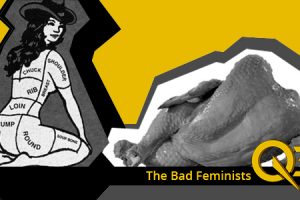by Morgane Dirion
To be able to answer Berenice Fisher’s question on whether guilt is ÔÇ£a patriarchal notionÔÇØ is to be able to understand one of the key concepts of the women’s movement, one that is usually brought up often yet very rarely explained. This lack of academic material on feminist guilt, on what it means in women’s everyday lives, on what it means as a structural concept, on its relation to a patriarchal system, therefore makes it hard to define.
And when feminists do write about it, they never seem to agree on a specific definition; some focus on the cultural aspect of guilt, as Emma Liggins does in 3 Feminisms, other see gendered expectations as architects of this guilt, as Janet K. L. McKeown argues in I will not be wearing heels tonight! However, as Shirley Anne Tate or Heidi Safia Mirza point out, feminist guilt also needs to be studied in relation to liberal white feminism, which has for long been considered the norm, and that has for long ignored the needs and the voices of minorities, now creating a huge reservoir of guilt among some women.
Personal accounts in feminist writings allow us to take a deeper look at this notion of guilt. McKeown uses several anecdotes from her dating experience to support her argument: she talks about a date she does not want to go to; she talks about the kiss she gave a man at the back of a taxi; she talks how about she told herself to not wear heels anymore. She says she wonders if these things make her ÔÇ£feminist enough.ÔÇØ Similarly, in her 2006 essay Hot or Not? Courtney Martin explains feeling guilty after realising that she worried more about her looks while promoting her new book than about her words. Both writers, by connecting their argument to their personal experience, help readers understand this feminist guilt they may or may not be ready to face. Because facing feminist guilt is not easy. It means challenging everything you have learned ÔÇô not only the patriarchal structures you have been deconstructing while debating or reading feminist literature, but also the things you have been taught within the Women’s movement.
Because racism exists within the feminist movement and has been institutionalised for so long, attempts to undermine its existence as a structural phenomenon do not make any sense; denying the ÔÇ£coloniality of power,ÔÇØ as Shirley Anne Tate puts it, is ÔÇ£unthinkableÔÇØ. Why, then, does ÔÇ£evidence of racism in our own house [keeps emerging],ÔÇØ as Berenice Fisher writes? What solution can be found? How do you change a behavior fueled by the whole structure of society? For both women, the answer is guilt. When guilt is felt, one knows one has done something wrong and so starts to feel the need to correct the wrongdoings; guilt then turns into the ÔÇ£basis for anti-racist changeÔÇØ, says Tate. Guilt becomes more than an emotion, it becomes a challenge to your own knowledge of feminism.
Sister Outsider came out in 1984. The Female Mystique, another revolutionary book for feminist theory, in 1963. In the latter, Betty Friedan discusses the place of American women within their society. Even though Lorde would probably criticise the book for being way too white and middle-class centered, it is nonetheless an important tool of analysis. Friedan writes that ÔÇ£a woman has got to be able to say, and not feel guilty, ÔÇÿWho am I, and what do I want out of life?ÔÇÖ,ÔÇØ that ÔÇ£she mustnÔÇÖt feel selfish and neurotic if she wants goals of her own, outside of husband and children.ÔÇØ In 1963 already, then, was this idea of guilt imposed on women in order to restrain their desires. If it worked so well, it is because it was created back when the image of the perfect American housewife was still highly influential. One with five kids, a loving husband and a nice suburban house. One that still predominates more than 40 years later, as Imogen Tyler publishes The Selfish Feminist. Tyler explains that the guilt women feel is an ÔÇ£induced response,ÔÇØ one producing ÔÇ£self-censorship, keeping women ‘in their place’.ÔÇØ
Hence, women feel guilty for having desires and capabilities of their own, and feminists feel guilty for looking like these women. Indeed, Emma Liggins’ 3 feminisms underlines how ÔÇ£the figure of the feminist intellectual had to be constructed in terms of a hostility to femininity,ÔÇØ how the opposition between feminist and housewife, between feminist and feminine, was important within the women’s movement in order to have some kind of legitimacy. And how it drove some feminist to be ashamed, for instance, to enjoy popular culture, to watch soap operas or to read women’s magazines.
It seems that women, whether they identify themselves as feminists or not, always feel guilty. They feel guilty because of the patriarchy, they feel guilty while fighting it, they feel guilty even accepting it. They feel guilty calling themselves feminists, they feel guilty not doing so. They try to explain how guilt is a constructed norm yet they cannot escape it within their own movement. To answer Fisher’s initial question, guilt is without doubt ÔÇ£a patriarchal notionÔÇØ as it is quite hard to find something in our modern society that is not.










